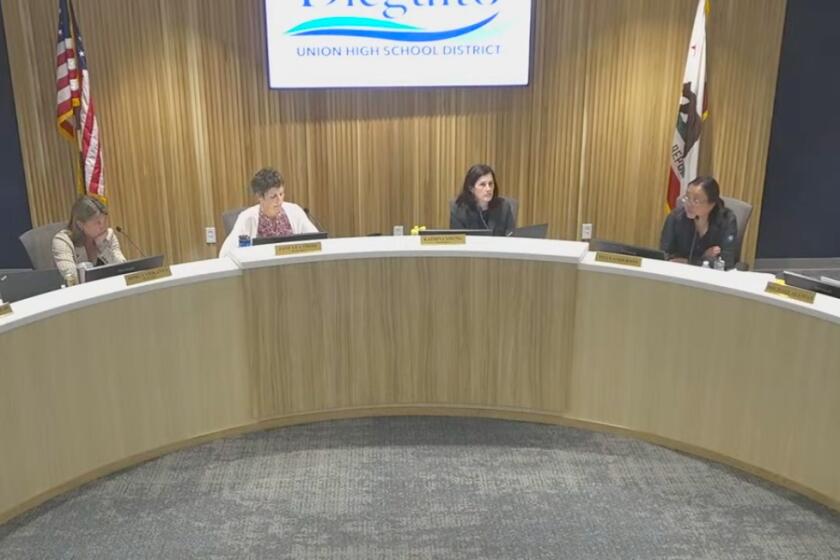City continues its discussion on pot cultivation in Encinitas
The city’s Adult Use of Marijuana Act (AUMA) Subcommittee met with residents and business owners again on May 15 to continue exploring the possibilities of cultivation and delivery in Encinitas.
The subcommittee — comprised of Deputy Mayor Tony Kranz and Council member Joe Mosca — invited consultant Neil Hall, with SCI Consulting Group, to offer legal perspective on the issue and insight from other cities.
Hall said he has been working with 10 different California cities to regulate marijuana since the passing of Prop. 64, which legalized the recreational use of marijuana in California. He also consulted the city in the past regarding cannabis, according to Kranz.
The city is looking at Santa Cruz, Sacramento and Berkeley as possible models for an ordinance, said City Attorney Glenn Sabine.
Hall said Encinitas should develop a flexible ordinance that includes definition, operational standards and its priorities, among other items, in the ordinance.
“The list is just very, very involved,” he said.
Sacramento, for example, has struggled, Hall said. That city’s ordinance did not pass in the last election “partially because of the way it was written.”
Encinitas should also consider water supply, water waste from cultivation and adding regulatory and land-use ordinances without conditional use permits.
“Both industry and non-industry people support following the rules because it protects everybody,” he said.
No decision was made at the meeting. Instead, the discussion, which began April 12, continued, with the crowd appearing split on how Encinitas should write its ordinance regarding the drug.
Some pushed for responsible delivery systems, expanded research options and limited cultivation on farms.
Bob Echter, of Dramm & Echter Inc. in Encinitas, who has advocated for cultivation on a portion of his 800,000-square-foot agricultural property, said he has had follow-up discussions with several other growers and residents who are interested in licensed cannabis businesses for processing and creating medical products.
“In short, allowing smart uses for cannabis will allow Encinitas to maintain its position at the forefront of commercial agriculture,” said Echter, who added he has created a draft ordinance with a consultation team.
But opponents warned about possible dangers toward the youth and community overall and shared concerns that some proponents did not live in the city and were just looking for monetary profit.
Nancy Perry-Sheridan, a Cardiff resident, referred to a recent resolution passing by the San Dieguito Union High School District (SDUHSD) that it did not support youth access to marijuana in the cities within the district, including Encinitas, Del Mar, Carlsbad, Solana Beach, Carmel Valley and Rancho Santa Fe.
“Commercializing marijuana would increase its availability and normalize its use, leading to increased negative health consequences, particularly among young people,” the resolution reads.
Mosca said the city council is also against youth access to marijuana but questioned how that can be regulated when cities outside SDUHSD sell the drug. Encinitas has no plans to allow storefronts, he said.
Perry-Sheridan said education and communication are key in that matter.
Mosca also said the city is working to regulate access for youth by banning marijuana edibles in city parks and beaches.
Hall warned that would be tough to regulate, and cities that have attempted to do so have not so far been successful.
“Edibles are something you would have a lot of difficulty in detecting,” he said.
Peggy Walker, a youth prevention educator, urged the city to not have a marijuana ordinance at all and ban it outright.
“As long as we have marijuana, it is going to be sold to kids,” she said, referring to illegal re-sale markets.
She said she cannot yet support delivery and commercial cultivation because “we’re not there yet.” The city should wait until the state writes its final regulations before writing drafts of its own, she suggested.
The city is also discussing the possibility of conducting a scientific survey. Mosca and Kranz deliberated on looking at the city of Vista’s survey results before conducting a survey for Encinitas.
Last October, the city council opposed Prop. 64, and in 2014 Encinitas residents rejected Measure F, an initiative that would have allowed medical marijuana dispensaries in the city. Sixty-five percent of voters in Encinitas supported Prop. 64 in the November election.
Sabine at the Feb. 15 meeting advised that if a city does not take action regarding non-medical marijuana, the state can issue a license for a business in a city without the city’s input.
Sign up for the Encinitas Advocate newsletter
Top stories from Encinitas every Friday for free.
You may occasionally receive promotional content from the Encinitas Advocate.






